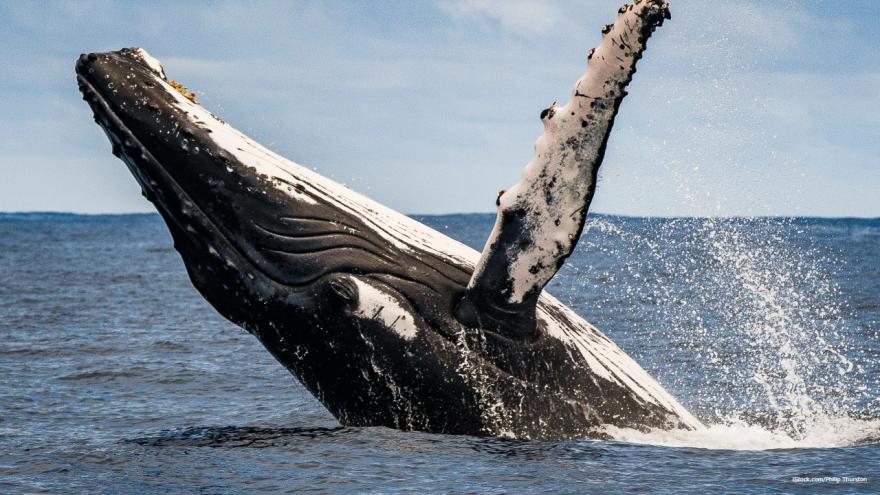
Whales, dolphins and seals living in U.S. waters face major threats from warming ocean temperatures, rising sea levels and decreasing sea ice volumes associated with climate change, according to a first-of-its-kind assessment.
Researchers with the National Oceanic and Atmospheric Administration examined more than 100 stocks of American marine mammal species and found more than 70% of those stocks are vulnerable to threats, such as loss of habitat and food, due to the consequences of warming waters. The impacts also include loss of dissolved oxygen and changes to ocean chemistry.
The scientists found large whales such as humpbacks and North Atlantic right whales were among the most vulnerable to climate change, and that other toothed whales and dolphins were also at high risk.
The study, published last month in the journal PLOS ONE, is evidence that the way the U.S. manages whales and dolphins needs to adapt in the era of climate change, advocates for marine mammals said.
The news is bleak, but the assessment also is the first to look solely at marine mammal stocks managed by the U.S. and the results can help inform federal ocean managers about how to safeguard the vulnerable animals, said Matthew Lettrich, a biologist and lead author of the study.
The researchers studied marine mammals living in the western North Atlantic ocean, Gulf of Mexico and Caribbean Sea. The animals are managed by the National Marine Fisheries Service, the arm of the federal government responsible for stewardship and protection of marine resources.
The scientists looked at the animals’ degree of exposure to climate change and sensitivity and capacity to adapt to it. They found 72% of the stocks were highly or very highly vulnerable to climate change, with a little less than half falling in the “very high” category.
The warming ocean primarily harms marine mammals by altering their ability to find food and reduces their amount of suitable habitat, the study said.
However, the scientists said changes to ocean temperature and chemistry also can change sound transmission. That can affect the sonar-like echolocation marine mammals such as dolphins use to communicate and hunt. Climate change “must be considered to adequately manage species,” the study states.
The NOAA study is significant because it’s the first to look broadly at U.S. marine mammals and attempt to predict their resiliency to climate change, said Regina Asmutis-Silvia, a biologist with Massachusetts-based Whale and Dolphin Conservation who was not involved in the study.
The whales will benefit from the study if the information is used to implement laws protecting them, Asmutis-Silvia said.
“The U.S. is one of the most data-rich countries when it comes to marine mammals, and those data should be driving what are arguably some of the world’s strongest laws to protect marine mammals,” she said. “However, data are meaningless without the political will to implement management measures.”
The impact of climate change on whales around the world has grown as a subject of scientific inquiry in recent years. Many studies about whales and climate change look only at a single species or a narrower geographic area, said Laura Ganley, a research scientist with the Anderson Cabot Center for Ocean Life at the New England Aquarium in Boston.
But the way climate change affects the giant animals is global in nature, so the broader approach is helpful, she said.
Many scientists have said the vanishing right whale that lives off New England in the summer is made more vulnerable by changes to its food availability caused by warming waters. But climate change also clearly affects less-studied species, Ganley said.
“This isn’t just impacting North Atlantic right whales or bottlenose dolphins. This is impacting most stocks in the United States, and not just the ones in the Caribbean Sea or the Gulf of Maine,” said Ganley, who was not involved in the study.
Climate change also could affect the distribution and behavior of marine mammals, the study states.
Whales such as the right whale, which travels north every year from the waters off Georgia and Florida, migrate hundreds of miles annually to breed and feed. Many also migrate across international boundaries, which could require new kinds of cooperation between countries. That is true of seals with large populations in the U.S. and Canada, such as the gray seal, the study says.
The federal government has tried numerous methods in recent years to try to protect declining whale species, including implementing new restrictions on commercial fishing and new vessel speed restrictions. Whales are vulnerable to entanglement in fishing gear and collisions with large ships, and scientists have said both threats are made more severe by warming waters because ocean changes cause whales to move outside of protected zones.
Safeguarding whales during the era of climate change will require ocean managers to plan for a future in which whale habitats are potentially less suitable due to the warming waters, said Gib Brogan, campaign manager with environmental group Oceana.
“This study provides guidance on how managers could prioritize species that are most vulnerable to climate effects and give these species the attention that they need,” Brogan said. “If we are going to preserve biodiversity, including marine mammals, ocean managers need to explicitly account for current and future changes in the ocean as they consider ways to conserve marine life.”
___
Follow Patrick Whittle on X, formerly Twitter: @pxwhittle







